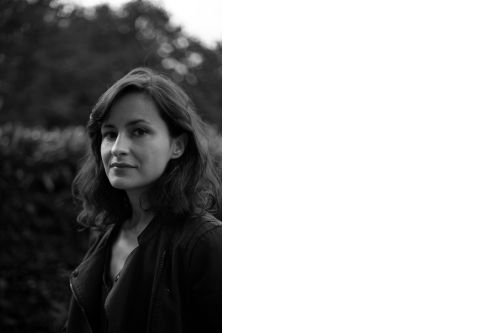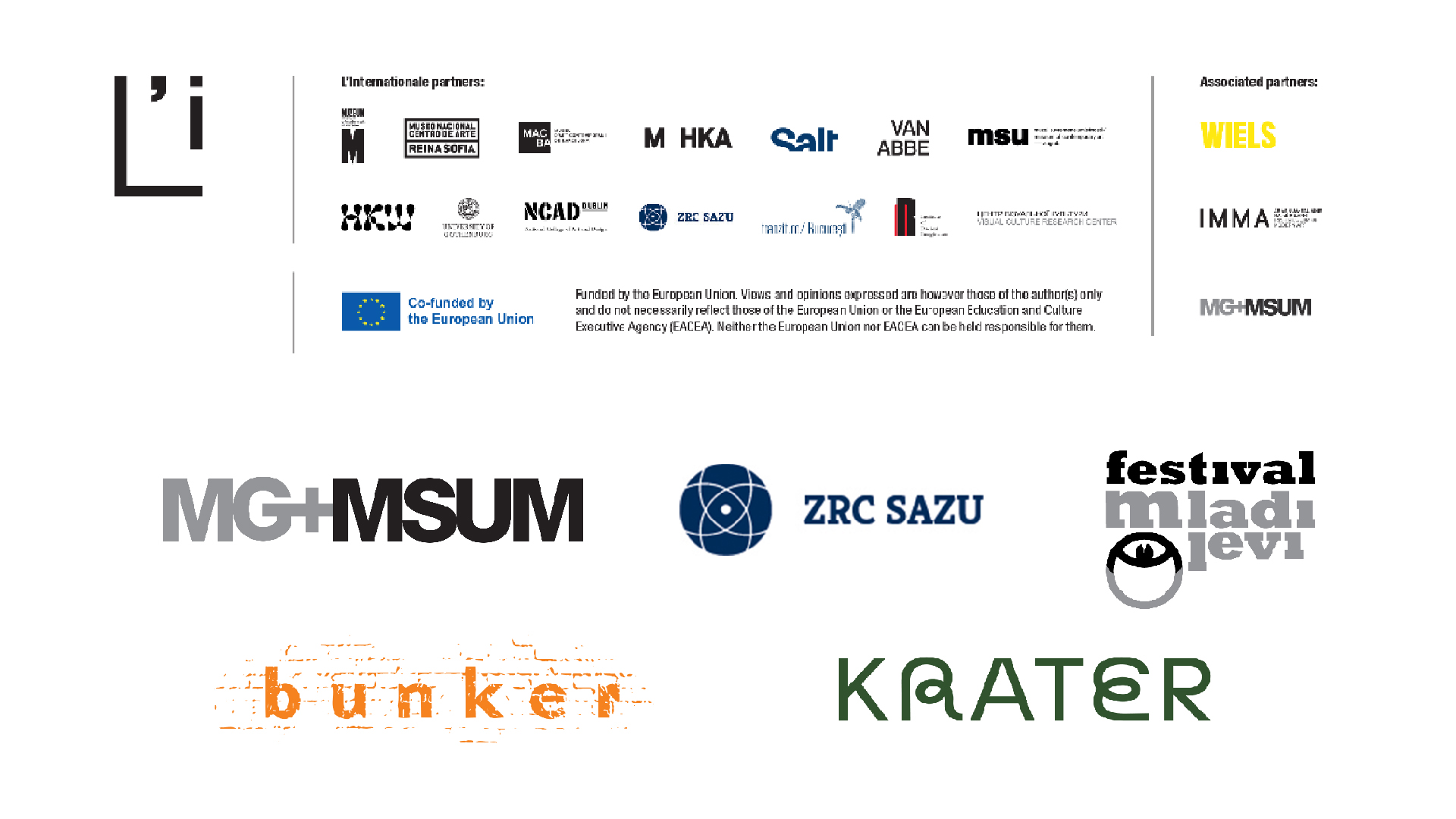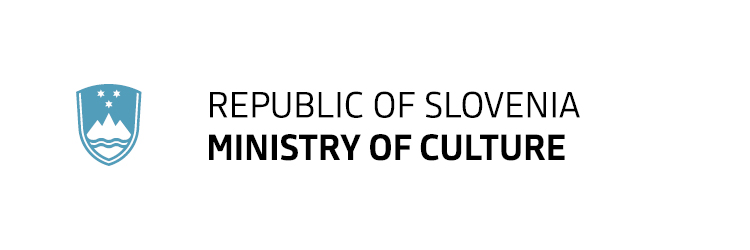Mladen Stilinović: It’s necessary, 1980, pastel on paper, Moderna galerija.
In the last week of August 2024, Moderna galerija in Ljubljana is organizing its third international summer school, this time entitled Our Many Easts. The first summer school, Constructing Utopia, took place in 2018, and the second, The Big Shift: The 1990s. Avant-gardes in Eastern Europe and Their Legacy, in 2019. Our Many Easts will be held at Moderna galerija’s two venues, the Museum of Modern Art and the Museum of Contemporary Art Metelkova, as well as at ZRC SAZU, Krater, Bunker, and other locations in Ljubljana.
The 2024 summer school will continue to focus on themes related to Eastern Europe, with a special emphasis on the expanded notion and understanding of the East, its arts, artists, art collectives, and the social and political contexts that have defined the geopolitical-social-cultural East(s) over the last decade.
When the end of the Cold War was proclaimed in 1989, the victory of liberalism over communism was expected to bring “Western liberal democracy” and an “open society” to the countries of the former Eastern bloc and beyond. Consequently, the Non-Aligned Movement, founded in Belgrade in 1961 as a third way between the two blocs, lost its relevance. Then, in the 1990s, nationalisms and ethnic tensions led to war and the break-up of socialist Yugoslavia. Yet what we have seen over the last 30 years is not only the dissolution of the idea of liberal democracy that the East so eagerly embraced, but also, as Ivan Krastev put it, liberalism abandoning pluralism for hegemony. Recent years have seen constant tensions in the East, the emergence of new autocratic regimes, continuing refugee crises, persistent nationalist tendencies in the Balkans, the war in Ukraine, the unresolved “Palestinian question” and the genocide in Gaza. When the Berlin Wall came down, there were 16 border fences in the world. Today there are 65, and the number is growing. To return to Krastev and Holmes: The future was better yesterday. From this perspective, we ask what tools can historical experiences, genealogies of knowledge, artistic practices from the East(s) provide us with in our present, bereft of future?
The summer school will offer many different perspectives on the idea of the East(s), starting with the question: What is left of the idea of Eastern Europe today? This broad theme will cover topics such as the legacy of the Eastern European avant-gardes, archives as tools of emancipation, the new “non-aligned” networks, art in times of conflict and war, ecology and the environment.
The summer school will be organized around five themes: The East and Beyond, The Yugoslav Socialist Project as a Source of Knowledge, The Non-Aligned Movement, Film-History-Archives, and Social Ecology.
Summer school participants will have a unique opportunity to experience Moderna galerija’s Arteast 2000+ collection up close, get an in-depth insight into the exhibitions at MG+MSUM together with the artists and curators, visit the archives, discuss the themes of the East(s) with experts in the field, experience the local art scene, meet artists and theoreticians, participate in the annual Mladi levi (Young Lions) festival, take a very different tour of Ljubljana, and much more.
Our Many Easts is aimed at postgraduate students and art professionals interested in the focal topics, and will offer courses on the interpretation and presentation of selected topics in the formats of workshops, lectures, performances, guided tours, and discussions.
The workshop facilitators and speakers include Ana Adamović, Zdenka Badovinac, David Crowley, Hana Ćurak, Sanja Horvatinčić, Urška Jurman & Mateja Kurir & Polonca Lovšin, Bojana Kunst & Ivana Müller, Krater collective (Gaja Mežnarić Osole, Danica Sretenović), Tevž Logar, Kumjana Novakova, Tanja Petrović, Bojana Piškur, Martin Pogačar, Dubravka Sekulić, Mabel Tapia, Mila Turajlić, Ala Younis.
The author of this year's summer school concept is Moderna galerija curator Bojana Piškur. The student’s tutor is Adela Železnik (senior curator at the MG+MSUM), while the project is coordinated by Sanja Kuveljić-Bandić (MG+MSUM).
Sunday, 25 August 2024 | Moderna galerija, auditorium
19:00 | Mila Turajlić, Non-Aligned Newsreels: Fragments from the Debris - a live documentary performance
Mila Turajlić invites the audience into a process of confronting archival material which has fallen out of political narratives. The starting point is the recovery of a cache of reels kept in the vaults of Yugoslav Newsreels, filmed by their cameramen across the non-aligned world from the 1950s through the 1970s – within the ranks of the Algerian Liberation Movement and FRELIMO, for newly-independent countries such as Mali and Tanzania, at Non-Aligned Summits. Integrating this “resurfaced” footage with oral histories, sound recordings and personal archives into a confessional speculation, Turajlić performs the challenges of giving voice to unfulfilled political projects. The live “excavation” opens a space where she and the audience journey together, exploring the poetics of the fragmentary.
 Mila Turajlić, performans. Z dovoljenjem avtorice.
Mila Turajlić, performans. Z dovoljenjem avtorice.
Tuesday, 27 August 2024 | Moderna galerija, auditorium
Starting from her recent film Silence of Reason, Kumjana Novakova unveils the process of transformation of the archive of an international court case tried at the ICTY in The Hague into a fragmented audiovisual women’s archive of survival. Through the gesture of cinematic re-archiving, a major forensic archive that is governed, stored and managed outside of the political and social space it belongs to is reclaimed and activated from inside the geographies of survival. The film and its collective public performance activate a process along the archive and against the archive as they situate us as close as possible to the women witnesses who survived sexual violence and torture on the territory of the Bosnian town of Foča and its surroundings in 1992 and 1993.
 Kumjana Novakova. Photo: Dragica Nikolovska. Courtesy of the artist.
Kumjana Novakova. Photo: Dragica Nikolovska. Courtesy of the artist.
Wednesday, 28 August 2024 | ŠD Tabor (in collaboration with Mladi levi festival)
17:30 | Discussion Café: Ala Younis, Bojana Kunst, Ivana Müller (moderated by Klara Drnovšek Solina)
Thursday, 29 August 2024 | ŠD Tabor (in collaboration with Mladi levi festival)
17:30 | Discussion Café: Dubravka Sekulić, Maja Simoneti (moderated by Bojana Piškur)
DISCUSSION CAFÉS: ”Our” future spaces
This year, the Festival’s tradition of Discussion Cafés under the Tabor chestnuts over coffee, which continue to reflect on the role of art in the problem-oriented issues, will be linked to our Summer School. Its theme is Our Many Easts, while both Discussion Cafés will be dedicated to the topic of imagining or even creating future spaces. Spaces that are “ours” or shared are constantly under attack from many different forces – urbanisation, gentrification, commodification, commercialisation, as well as wars, resource depletion and consequent degradation – or subject to attempts to transform them by various interests.
The first panel will try to initiate a reflection on common spaces as spaces of potential for reparative practices, or how to rethink change in a way that brings community practices into the space and allows for the emergence or support of community.
The second panel will focus on community management and self-organisation in defending specific spaces and planning their future purpose and use.
 Debatna Kafana, 2022. Photo: Nada Žgank.
Debatna Kafana, 2022. Photo: Nada Žgank.
Friday, 30 August 2024 | ZRC SAZU atrium
Yugoslavia supported Guinea-Bissau’s war of independence in the 1960s, and continued to do so in different ways after 1973, when the country gained independence from Portugal and the bloody anticolonial war led by the communist African Party for the Independence of Guinea and Cape Verde (PAIGC) ended. Due to Yugoslavia’s political alliance and personal connections in the public works sector, Yugoslav experts greatly influenced the country’s cooperation sector in the 1970s and 1980s. Yugoslav architects contributed to numerous public works, but they also planned, designed and supervised projects of their own, ultimately dominating architecture in the country despite the growing presence of other approaches brought in by Guinea-Bissauans studying in the Soviet Union or Cuba.
Based on archival research, ethnographic encounters and a field survey, the lecture will present the memorial projects that emerged out of the Yugoslav cooperation with Guinea-Bissau and discuss their formal and social features in relation to the contemporary production of monuments in Yugoslavia, or the encounter with Portuguese colonial modernism. While Horvatinčić recognizes that Non-Aligned global exchanges and the mediation of transnational expertise and interests are important to consider, she argues that the work of Yugoslavs in Guinea-Bissau is better understood if we bring to light the ways in which they formed a community by weaving expertise, politics and intimacy. By acknowledging this complexity, we will be able to grasp how their presence is remembered and how their work continues to resonate in today’s Guinea-Bissau, both in the urban fabric and in people’s imagination.

Sanja Horvatinčić, 2019. Foto: M. Kralj.
Ala Younis is an artist with curatorial, film and publishing projects. She has exhibited in Amman, Dubai, Sharjah, New York, London, Seville and Prague. She curated the first Kuwaiti Pavilion at the Venice Biennale (2013), and co-curated the Singapore Biennale (2022). In 2012, Ala Younis co-founded Kayfa ta, a non-profit Arabic publishing initiative. She is the Artistic Director of the Akademie der Künste der Welt (Cologne), and Research Scholar at the al Mawrid Arab Center for the Study of Art at NYU Abu Dhabi.
Bojana Kunst is a philosopher, dramaturge and performance theoretician. She works as a professor at the Institute for Applied Theater Studies of the Justus Liebig University Giessen, where she leads an international master program Choreography and Performance.
Dubravka Sekulić is an architect, theorist and educator. Her research explores transformations of contemporary cities at the nexus between the production of space, laws, and economy. She is the MA City Design Programme Lead at the Royal College of Art. She holds a PhD from the Institute for History and Theory of Architecture, ETH Zurich (CH), on the relationship between the Yugoslav construction industry and the Non-Aligned Movement. She is working on a book with a tentative title, “City against the City – Minor Planning for a Liberated Future.” In addition, she is working on several co-edited volumes Take Back the Land, with Godofredo Periera, Life of Crops - Towards Investigative Memorialisation, with Milica Tomić and Philipp Sattler, and Curatorial Design with Wilfried Kuehn. She is the author of several books, including Glotzt Nicht So Romantisch! On Extralegal Space in Belgrade (Jan van Eyck Academie, 2012), and most recently she collaborated with artist and filmmaker Ana Hušman on Don’t Trace, Draw! (2020), a film that explored the spatial legacy of the Yugoslav pedagogical reform.
Ivana Müller is a choreographer, artist and writer. Through her choreographic and theater works, performances, installations, text works, video lectures, audio pieces, guided tours and web works she rethinks the politics of spectacle and the spectacular, revisits the places of the imaginary and imagination, questions the notion of “participation,” investigates the idea of value and its representation, and keeps on getting inspired by the relationship between performers and spectators.
Kumjana Novakova is a research-based filmmaker working also as film curator and lecturer. Born in Yugoslavia, Novakova has worked in film and the arts since 2006. She has co-founded the Pravo Ljudski Film Festival in Sarajevo and headed the Film Department of the Museum of Contemporary Arts in Skopje. As an artist, Novakova explores the languages of cinema researching relationships related to power, war, memories and (un)belonging. Novakova teaches cinema as an associate lecturer at film.factory of Bela Tarr in Sarajevo, ESCAC School of Cinema, Spain and the MA in Film Research of the Netherlands Film Academy.
Dr. Maja Simoneti graduated and obtained her PhD at the Department of Landscape Architecture of the Faculty of Biotechnology. Her professional activity is based on 30 years of experience in spatial planning in practice, which she has transferred and upgraded in recent years to consultancy and public interest advocacy in spatial planning and environmental protection, managing to combine her planning experience with the development of new practices and applied research. With a scope of activity and commitment that goes beyond the usual professional engagement, she has significantly influenced and contributed to the establishment of landscape architecture as a profession, while paving the way for newer generations in landscape architecture and other disciplines, including through her teaching work at several faculties.
Mila Turajlić, born in Belgrade, Yugoslavia, is an award-winning filmmaker and archive “artivist” whose works include Cinema Komunisto (2010) and the IDFA award-winning The Other Side of Everything (2017). Her most recent documentary diptych, Non-Aligned & Ciné-Guerrillas: Scenes from the Labudović Reels (2022), was described by The New York Times as “a visually arresting inquiry into what it takes to envision a new world.” She is the founder of the Non-Aligned Newsreels project (nonalignednewsreels.com), an artistic exploration of the “orphaned” status of the film archives curated by Yugoslavia in a gesture of “ciné-solidarity” with the non-aligned world. Performative and video iterations of the project have been curated for IDFA on Stage, international exhibitions (MoMA) and biennales (Berlin 2022, Sharjah 2025). In 2020 Turajlić was invited to join the Academy of Motion Picture Arts and Sciences (Oscars) Documentary Branch.
Sanja Horvatinčić is a Research Associate at the Institute of Art History in Zagreb. Her research focuses on the production of monuments and remembrance culture in socialist Yugoslavia, as well as on heritage and memory politics in the post-socialist context. She has participated in research projects dealing with the history of Yugoslav cultural politics and the Non-Aligned Movement, critical heritage studies, and digital art history. She participated in the research project “Models and Practices of Global and Cultural Exchange and the Non-Aligned Countries Movement, Research on Spatio-temporal Cultural Dynamics” (2020-2024), in which she deals with the relationship between the legacy of the Yugoslav anti-fascist struggle and anti-colonial movements in the countries of the Global South through cultural exchange within the Non-Aligned Movement. In 2023, she coedited the book Shaping Revolutionary Memory: The Production of Monuments in Socialist Yugoslavia (Archive Books Berlin, Igor Zabel Association Ljubljana).
Our Many Easts summer school is organized by Moderna galerija in Ljubljana in partnership with ZRC SAZU (the Research Centre of the Slovenian Academy of Sciences and Arts) as part of L’Internationale project Museum of the Commons.
Organizers
Moderna galerija, Ljubljana; ZRC SAZU
Partners
Bunker, Mladi levi; Krater



Funded by the European Union. The views and opinions expressed, however, are those of the authors only and do not necessarily reflect those of the European Union or the European Education and Culture Executive Agency (EACEA). Neither the European Union nor EACEA can be held responsible for them.